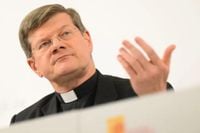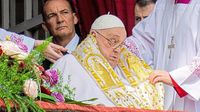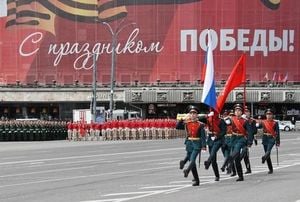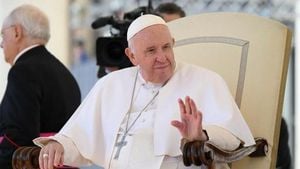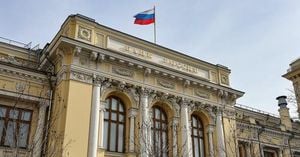Freiburg, Germany - The death of Pope Francis has evoked profound grief among the faithful, with Archbishop Stephan Burger of Freiburg expressing deep appreciation for the late pontiff. Pope Francis, who passed away on Easter Monday, April 21, 2025, at the age of 88, was mourned by approximately 1.4 billion Catholics worldwide. His heart ceased beating at 7:35 AM, marking the end of an era for the Catholic Church.
Archbishop Burger reflected on the hopes that Pope Francis inspired during his papacy, stating, "With his dedicated commitment to the dignity of all people and for peace, he became a guardian of universal human rights, peace, and human freedom." This sentiment resonates deeply in the southwestern region of Germany, where many share a sense of loss and admiration for the Pope's efforts to connect with the marginalized and uphold human dignity.
Born Jorge Mario Bergoglio in Argentina, Pope Francis was often referred to as the "Pope from the other end of the world." His papacy began in March 2013, following the resignation of Pope Benedict XVI. The transition was electrifying for many believers, who were eager for a fresh start after a tumultuous year marked by the "Vatileaks" scandal and revelations of abuse cover-ups.
Upon his election, Francis quickly made headlines by rejecting the opulence traditionally associated with the papacy. He opted to reside in the Santa Marta guesthouse instead of the Apostolic Palace, signaling a commitment to humility and accessibility. This choice reflected his desire to be closer to the people, embodying his mantra of reaching out to the "periphery" of society.
His approach to leadership was characterized by a focus on social justice and an emphasis on compassion. During his papacy, he made significant strides in addressing issues such as poverty and inequality. One of his notable early trips was to Lampedusa, where he met with refugees, highlighting the plight of those fleeing war and persecution. This visit was emblematic of his dedication to humanitarian causes, and he often spoke of the need for the Church to engage with the world's most vulnerable populations.
In 2014, Pope Francis made a historic trip to Israel, where he sought to foster peace and reconciliation in the Middle East. His meeting with Israeli President Shimon Peres and Palestinian President Mahmoud Abbas in the Vatican Gardens, where they planted an olive tree together, symbolized hope for a resolution to long-standing conflicts. The Pope's words during this event, stating that "the world is merely a loan from our children," resonated with many and underscored his commitment to global peace.
Despite his many achievements, Pope Francis faced challenges and criticisms during his tenure. His relationship with conservative factions within the Church became strained, particularly as he grappled with the expectations of both traditionalists and reformers. Notably, he removed Cardinal Gerhard Ludwig Müller, a confidant of Pope Benedict, from his position as Prefect of the Congregation for the Doctrine of the Faith, which drew mixed reactions from the Catholic community.
Moreover, his candid remarks sometimes sparked controversy. In 2015, while en route to the Philippines, he expressed understanding for the Charlie Hebdo attackers, a statement that drew significant backlash. Additionally, his comments equating child discipline with respect for dignity were met with criticism, leading to headlines like "Papperlapapst" in the media.
Nevertheless, his compassion for the sick and elderly endeared him to many. He was often seen prioritizing the needs of the vulnerable during public appearances, reinforcing his image as a "Pope of the people." His willingness to engage with crowds and share moments of genuine connection was a hallmark of his papacy. Observers noted that he was a stark contrast to his predecessor, who preferred a more reserved approach.
As tributes poured in following his death, a sea of candles was lit outside the Agostino Gemelli Polyclinic in Rome, where the faithful gathered nightly to pray for their beloved Pope. This outpouring of grief reflects the profound impact that Francis had on the Church and its followers. His legacy is one of accessibility, humility, and a steadfast commitment to the values of compassion and justice.
In his final wishes, Pope Francis expressed a desire to be buried not in St. Peter's Basilica but in the Church of Santa Maria Maggiore, a place where he prayed before and after his travels. This decision further emphasizes his connection to the people and his commitment to being among them, even in death. Plans are underway for a procession through the streets of Rome, allowing the faithful to pay their respects as he makes one last journey through the city he loved.
As the world bids farewell to Pope Francis, many reflect on his unique ability to bridge the gap between the papacy and the people. His approach to leadership, marked by humility and a focus on social justice, has left an indelible mark on the Catholic Church. His passing is not just a loss for the Church but for millions who found hope and inspiration in his message of love and compassion.
Adiós, Francisco, as he is affectionately known in his native Argentina. This farewell carries a profound meaning, signifying a return to God and the belief that life continues beyond this world. For many, Pope Francis will always be remembered as a shepherd who walked among his flock, embodying the spirit of the Church in a way that few have before.
